Why Concrete Pools Pop Up Out Of The Ground: Reasons, Problems & When To Worry
Home » Pools and Spas »

In-ground concrete pools pop up out of the ground for a number of reasons and these pop ups are very costly to repair. Usually we don’t worry about pop ups but there are cases when we should. Unfortunately, homeowner’s insurance does not cover the damage from pool pop ups in many cases, therefore we should know what to do or not do when it comes to a pool popping or floating up.
Hydrostatic pressure and other causes
It’s hard to believe that a heavy concrete gunite or shotcrete pool weighing many tons will float up or raise out of the ground, however it does happen. In reality a pool is like a boat or a large ship, which may weigh many tons yet it is still able to float. With a swimming pool, it is hydrostatic pressure or the pressure of underground water, that causes a pool to float up or pop up in most cases. How high a pool pops up or floats up varies considerably; it may be only a few inches or several feet and can happen overnight
Damage from a pool or spa floating or popping up
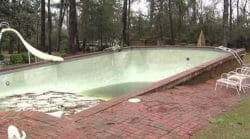
When this happens, the underground PVC pipes may crack or separate and the pool shell itself may crack. Usually the coping around the top edge of the pool cracks or comes loose and concrete decks near the pool may likewise suffer damage. Electrical conduits and wiring going to the pool lights can also become separated or damaged, creating a risk of shock or electrocution.
Concrete ships WW1 and WW2

Historically, there have been boats and barges built out of concrete. During both World War 1 and World War 2 the US government, as well as some other countries, have had a few concrete ships and barges built because of steel shortages.
However, because of their weight, cost and other factors, these ships did not serve for long, but they did float.
Reasons for pop ups
Most pool pop ups occur when a pool is empty or only slightly filled, however there are a few instances where a pool may rise or pop up slightly, even when full of water.
Emptying pool to re-plastering or repairs
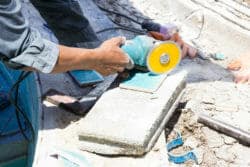
Homeowners or contractors empty a pool to re-plaster it or do certain repairs. Occasionally, during this period of time a series of thunder storms roll through the area dumping lots of rain.
Much of this rain water penetrates into the ground, raising the inground water table, which creates a lot of hydrostatic pressure pushing up on the pool. After the water table raises enough, the pool may float or pop up out of the ground.
Floods
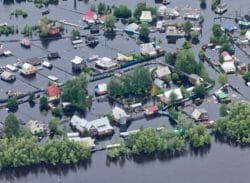
Areas that have flooding will often have a number of pool issues, one of which is popping up. Again, it is usually a pool that was empty before the flood occurred that floats up. Note that if a pool pops up in flooding, homeowners should check their homes’ foundation for damage. (Read about flood damage to foundations)
Once in a while a home owner will decide to empty his pool of mud or muddy water after the flood has receded but forgets that the ground is still highly saturated and that his pool may pop up.
High-water table
The water-table level of an area may vary seasonally because of droughts, seasonal rain and floods. Areas may have a high-water table due to an underground spring or the geological configuration of an area.
For many concrete pools it requires only about a 20” to 40″ difference in the water level from inside the pool to the outside water table level to cause them to pop up or float.
Low-lying areas
Pools built near a lake, river or ocean that are at approximately the same elevation as the body of water are more prone to floating or pop ups.
Storms and days and days of rain
Storms with excessive moisture and long periods of rain tend to raise water table levels and increase the risk of pop ups. Homeowners should check to see if their property drains well and quickly; that water does not stand or puddles for long periods of time.
Piping leaks
If a water line breaks or leaks under or near a pool the soil may become fully saturated over time. When the saturation reaches a point, that there is sufficient water under the pool, it may cause the pool to float or pop up.
Expansive soils
When there are expansive soils, especially those with a very high clay content, there is the risk of significant pressures being generated that could push a pool upward. Expansive soils can exert pressures on a pool shell of 5,000 to 10,000 PSF (pounds per square foot) or more. This can easily lift or push a pool upward.
Preventing pool pop ups
Does your pool have an hydrostatic pressure valve?
One thing that pool builders do today is to install a hydrostatic pressure relief valve when they build a pool. The valve is usually located in the deepest part of the pool body. And when the hydrostatic pressure builds up (the water table rises) to a certain level, the valve opens up and this relieves the pressure.
Dewatering systems
Another method that helps reduce a water table level build up under a pool is to have a dewatering system. Most dewatering systems have some form of pump, either a surface type or one located below grade; at times a sump pump will be used. These pumps go on when the water table levels reaches a certain level and pumps out the excess water.
Older pools
Older pools often do not have an hydrostatic pressure valve or a dewatering system. Depending on where you live in the US there are a number of options that you may be able to do that will significantly reduce the risk of your pool popping up. Consulting with a qualified pool contractor can give you a number of options that will work in your area.
Home Buyers
Whether buying a 5 year-old home with a pool or one that is 20 years old, it would be wise to have a pool inspection by a qualified pool inspector. If the pool is empty, then it is even more important to have an inspection, for it’s difficult to know if the pool equipment operates or leaks. Also, if the pool is empty and a lot rain occurs, there might be a possibility of a pop up. (Read about pool inspections)
Bottom Line
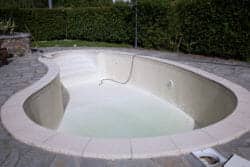
Pools are great for kids and families and will generally last for many years if well maintained. In the majority of cases pool pop ups occur when the pool is empty.
When a pool or spa pops up or floats up, it is usually for one of five reasons.
- The pool was drained for some reason i.e to re-plaster it, to winterize it or do repairs and the water table level rose.
- Floods, storms and heavy rains
- High water table issues
- Expansive soil issues
- No hydrostatic pressure valve or dewatering system

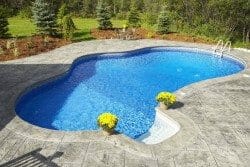
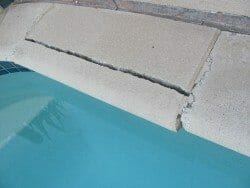
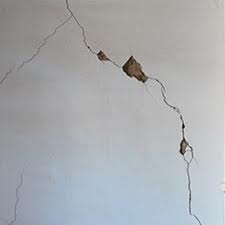
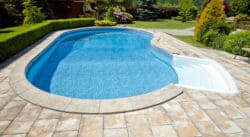

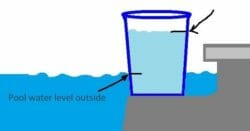

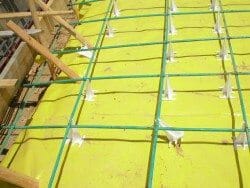


I have a cottage waterfront on the beach. We had 8 ft waves for 3 to 4 days and the deck (35 ft long)popped up and broke in three pieces from the pressure underneath, How can we rebuild it so it doesn’t happen again? Joy
appears that all causes of pools popping are the result of hydrostatic pressure. I would like to know if you know of other causes which do not involve ground water. I appreciate your response.
Thanks for sharing this informative article on gunite pools! It’s crucial to know about the potential issues. This article provides valuable insights and advice. If anyone is considering getting a gunite pool or already has one, I highly recommend giving it a read.